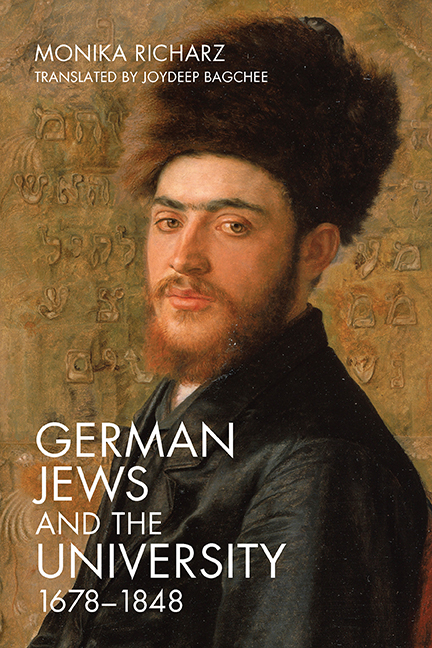Book contents
- Frontmatter
- Dedication
- Contents
- Foreword to the English Edition
- Foreword to the German Edition
- Preface to the German Edition
- Translator’s Note
- List of Abbreviations
- 1 Jewish Education in the Enlightenment Era
- 2 Jewish Encounters with the University before Emancipation
- 3 Jewish Students in the First Half of the Nineteenth Century
- 4 The Social Situation of Jewish Students in the pre-1848 Era
- 5 The Professional Experience of Jewish University Graduates
- Conclusion
- Documents
- Bibliography
- Index
Preface to the German Edition
Published online by Cambridge University Press: 15 September 2022
- Frontmatter
- Dedication
- Contents
- Foreword to the English Edition
- Foreword to the German Edition
- Preface to the German Edition
- Translator’s Note
- List of Abbreviations
- 1 Jewish Education in the Enlightenment Era
- 2 Jewish Encounters with the University before Emancipation
- 3 Jewish Students in the First Half of the Nineteenth Century
- 4 The Social Situation of Jewish Students in the pre-1848 Era
- 5 The Professional Experience of Jewish University Graduates
- Conclusion
- Documents
- Bibliography
- Index
Summary
THE PRESENT WORK seeks to contribute to the educational and social history of the Jews in Germany. In that it deals with the rise of a university- educated elite among the Jews of Germany, it also provides an excerpt of the history of acculturation and emancipation of German Jewry. Setting out from an account of the traditional religious ideal of education current among Jews of the seventeenth century, I trace the process of the “secularization” (Verweltlichung) and assimilation of Jewish education, as more Jews began to pursue university study. My aim is primarily to provide a social history of the Jewish intellectual elite and not to undertake an intellectual- historical analysis of acculturation, even though both aspects are closely related.
It is a recognized fact that, relative to their numbers, German Jews were significantly over-represented in the bourgeois middle class in the Weimar period and in many professional occupations. The economic presuppositions of this rise and the economic expansion of the Jews of Germany have often been dealt with in their individual details, but we lack investigations into the role of Jewish intellectuals in the process of social assimilation to the German bourgeoisie. I have deliberately chosen the early history of this process as my topic because the transformation of the ideal of education and an understanding of the social function of education in the emancipation period are decisive if we are to understand the process of this ascent.
Since the Jews were a minority and still faced social discrimination despite the progress of emancipation, it was inevitable that, in their struggle for social recognition, they would aspire all the more to education and culture (Bildung) and to property (Besitz), these foundations of the bourgeoisie. Particularly in the first half of the nineteenth century, education began to play a paramount role as a means of social ascent among Jews as well as Christians. When a census of denominations was undertaken for the first time at Prussian universities in 1886–1887, it showed that, relative to their share of the population, Jews formed an eight times greater proportion of students.
- Type
- Chapter
- Information
- German Jews and the University, 1678-1848 , pp. xvii - xxPublisher: Boydell & BrewerPrint publication year: 2022

